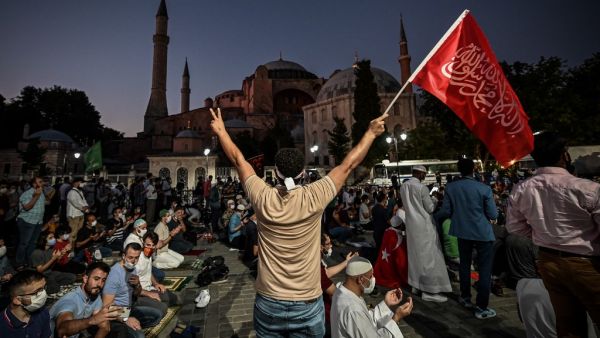Turkish President Recep Tayyip Erdogan’s decision to convert Istanbul’s Byzantine-era cathedral Hagia Sophia to a mosque has unleashed a current of criticism in Western capitals and is being interpreted by experts as an attempt by the Turkish leader to improve his political fortunes at home.
Through his decision, Erdogan is trying to expand his Islamic and nationalist base and divide the opposition at home at a time when his support is declining, analysts say.
“The decision is intended to score points with Erdogan’s pious and nationalist constituents,” said Anthony Skinner of the risk assessment firm Verisk Maplecroft.
“Hagia Sophia is arguably the most conspicuous symbol of Turkey’s Ottoman past — one which Erdogan is leveraging to strengthen his base while snubbing domestic and foreign rivals,” he said.
The court ruling Friday on Hagia Sophia’s status comes amid escalating tensions between Turkey and the European Union over Ankara’s controversial drilling strategy in the eastern Mediterranean and its involvement in the Libyan conflict.
Turkey has sent drones, military advisers and thousands of Syrian mercenaries to support the Islamist-dominated Government of National Accord in Tripoli.
Hagia Sophia’s transformation into a mosque in defiance of the West “is consistent with Turkey’s muscular foreign policy”, said Skinner.
“It is consistent with the government’s projection in the east Mediterranean and Libya.”
Jean Marcou, associate researcher at the French Institute for Anatolian Studies, said altering Hagia Sophia’s status would “move Turkey even further away from its Western allies, affect Greek-Turkish relations and likely hamper Russian-Turkish ties.
“Symbolically, such a decision would appear as the culminating point for Turkey which has systematically gone on the offensive in all theatres of regional conflicts: Syria, Iraq, Libya and eastern Mediterranean,” he said.
“I was not surprised at all that the court weighed to sanction Erdogan’s moves because these days Erdogan gets from Turkish courts what Erdogan wants,” said Soner Cagaptay, of the Washington Institute.
“Erdogan wants to use Hagia Sophia’s conversion into a mosque to rally his right-wing base,” said Cagaptay, the author of “Erdogan’s Empire.” “But I don’t think this strategy will work. I think that short of economic growth, nothing will restore Erdogan’s popularity.”
The debate hits at the heart of Turkey’s religious-secular divide at home.
Critics accuse Erdogan of undermining the secular credentials laid down by Kemal Ataturk — the founder of modern Turkey.
Turkish President Recep Tayyip Erdogan, who has chipped away at the Muslim-majority country’s secularism, announced Muslim prayers on July 24 at the UNESCO World Heritage site.
Founded 1,500 years ago as a cathedral, the Ottomans made Hagia Sophia a mosque but it was turned into a museum in 1934 and is a UNESCO World Heritage Site.
Erdogan, who has in the past repeatedly called for the historic building to be renamed as a mosque, signed a presidential decree on Friday, handing over Hagia Sophia to Turkey’s religious affairs directorate for reopening to Muslim worship.
Aside from Nationalist and conservative groups, many others in Turkey have believed it should remain a museum, as a symbol of Christian and Muslim solidarity.
“It was a structure that brought together both Byzantine and Ottoman histories,” said Zeynep Kizildag, a 27-year-old social worker, who did not support the conversion. “The decision to turn it into a mosque is like erasing 1,000 years of history, in my opinion.”
Garo Paylan, an ethnic Armenian member of Turkey’s Parliament tweeted that it was “a sad day for Christians (and) for all who believe in a pluralist Turkey.”
“The decision to convert Hagia Sophia into a mosque will make life more difficult for Christians here and for Muslims in Europe,” he wrote. “Hagia Sophia was a symbol of our rich history. Its dome was big enough for all.”
Through his move, Erdogan is taking the risk of heightening tensions with the West as his country is embroiled in several regional conflicts.
Turkey’s fellow NATO members — the US and Greece — as well as Russia, have warned Ankara against reopening the Hagia Sophia to Muslim worship.
“The ruling by the Turkish Council of State to overturn one of modern Turkey’s landmark decisions and President Erdogan’s decision to place the monument under the management of the Religious Affairs Presidency is regrettable”, said EU Foreign Policy chief Josep Borrell.
The United States said Friday it was unhappy with the decision.
“We are disappointed by the decision by the government of Turkey to change the status of the Hagia Sophia,” State Department spokeswoman Morgan Ortagus said.
She said the US looks forward to making sure the monument “remains accessible without impediment for all. ”
Democratic presidential candidate Joe Biden also said Friday he deeply regretted Turkey’s decision.
Biden called on Erdogan to reverse it “and instead keep this treasured place in its current status as a museum, ensuring equal access for all.”
The move threatens to deepen tensions with neighbouring Greece, whose prime minister, Kyriakos Mitsotakis, condemned the decision as an affront to Hagia Sophia’s ecumenical character.
“It is a decision that offends all those who recognize Hagia Sophia as an indispensable part of world cultural heritage” Mitsotakis said. “
Cyprus condemned “Turkey’s actions on Hagia Sophia in its effort to distract domestic opinion and calls on Turkey to respect its international obligations,” tweeted Foreign Minister Nikos Christodoulides.
Vladimir Dzhabarov, deputy head of the foreign affairs committee in the Russian upper house of parliament, called the action “a mistake.”
“Turning it into a mosque will not do anything for the Muslim world. It does not bring nations together, but on the contrary brings them into collision,” he said.
UNESCO chief Audrey Azoulay said she “deeply regrets the decision of the Turkish authorities, taken without prior dialogue, to modify the status of the Hagia Sophia”.
The Istanbul-based Ecumenical Patriarch Bartholomew I, considered the spiritual leader of the world’s Orthodox Christians, warned last month that the building’s conversion into a mosque “will turn millions of Christians across the world against Islam.”
On Friday, Archbishop Elpidophoros of America said the decision runs counter to the vision of secular Turkey’s founder, Mustafa Kemal Ataturk “who understood that Hagia Sophia should serve all Turkey’s people and indeed the whole world.”
“The days of conquest should remain a closed chapter of our collective histories,” he said.
This article has been adapted from its original source.








